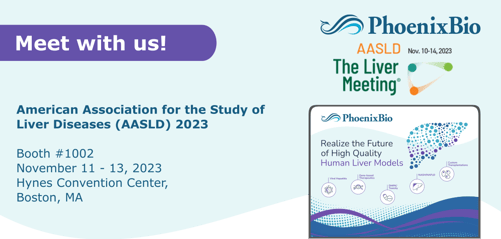Get ready to join the leading organization of scientists and healthcare professionals committed to preventing and curing liver disease! The Liver Meeting will cover a range of topics from cutting-edge studies in viral hepatitis, liver toxicity, gene therapy/editing, MASH/MAFLD, and more.
PhoenixBio is delighted to be attending The Liver Meeting in person at the Hynes Convention Center in Boston, MA on November 11th - 13th, 2023. Meet with our team at Booth #1002 to learn more about PhoenixBio's capabilities and how we can help you advance and deliver tomorrow’s therapies.
Featured PhoenixBio Workshop:
Title: Basic Research Workshop: Humanized Models: Tools to Advance Liver Disease Research
Speakers: Takeshi Saito, Michael Brehm, Osman Berk Usta, Pranoti Mandrekar
Date: Sunday, November 12, 2023; Time: 8:30 - 10:00
Location: Grand Ballroom - Sheraton Boston Hotel
Description: The use of in vivo, especially mouse models and in vitro approaches using transformed cell lines, has been central to understanding pathogenesis of liver diseases over the last several decades. Yet these studies have encountered challenges in translating discoveries in non-human models to clinical applications. In addition, logistical and ethical restrictions of working with human tissue samples has further limited our ability to translate findings from in vivo and in vitro models to human disease. There is a growing need to establish better models that faithfully recapitulate human biological and pathobiological systems as well as mimic human diseases to serve as effective pre-clinical models to develop new therapeutics.
In vivo chimeric or “humanized” mice and ex vivo models including organoids and 3D liver organ-on-a-chip systems have emerged to incorporate variables associated with disease pathogenesis, allow target identification, drug discovery and evaluation of efficacy of disease treatment. It is pertinent to use both in vivo and ex vivo models enabling an overall perspective of factors that together influence a biological process and/or disease state.
The Basic Research Workshop will convene over 500 basic and clinical investigators interested in establishing innovative in vivo and ex-vivo tools to understand liver biology and disease development. This workshop will discuss the development of humanized mouse models, liver-on-a-chip approaches and disease modeling using organoid systems.
PhoenixBio Related Abstracts:
- 1428-C: MATHEMATICAL MODELING OF HBV KINETICS IN HUMANIZED MICE SUGGESTS THAT NA BLOCKS NOT ONLY RCDNA PRODUCTION BUT ALSO PGRNA SYNTHESIS
- 1453-C: ADENINE BASE EDITING SILENCES HBsAg EXPRESSION AND INHIBITS HEPATITIS B VIRAL REPLICATION IN HBV MOUSE MODELS
- 1454-C: AN EFFECTIVE STRATEGY TO REDUCE HBsAg LEVEL WITHOUT DIRECT INHIBITION OF INTRACELLULAR HBsAg SYNTHESIS IN HBV INFECTED HUMANIZED MICE
- 1469-C: EVALUATING THE EFFICACY OF PEGYLATED IFN-LAMBDA AND IFN-ΑLFA TREATMENTS ON HBV AND HDV INFECTIONS IN HUMANIZED MICE
- 1905-A: MODELING HCV KINETICS FROM INOCULATION TO STEADY STATE IN SCID HUMANIZED MICE PREDICTS A PARTIAL BLOCK OF VIRAL PRODUCTION POSSIBLY DUE TO AN EARLY STAGE OF INNATE IMMUNE RESPONSE
- 3574-C | METABOLIC PERTURBATION IN ALCOHOLIC FATTY LIVER PRIMES HEPATOCYTE INJURY THROUGH DISCORDANT TRANSMISSION OF TRANSCRIPTOME ALTERATIONS TO PROTEOME
- 4406-A | HEPATOCYTE-INTRINSIC HUMORAL FACTORS DETERMINE THE ENVIRONMENTAL NICHE FOR HEPATOCYTE FATE DECISION AND MAINTENANCE
While you're there, be sure to attend PhoenixBio's workshops and related abstracts featured above and grab a chance to speak with our team!
